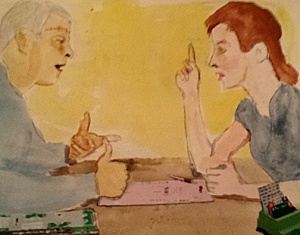It’s happened to every one of us bridge players. The game starts and partner is bright-eyed and alert, but only a round or two later, we detect a lobotomy scar on partner’s forehead and a drool cup attached to the chin. This certainly bodes no good. But perhaps there is something we can do about it. The following hand illustrates this:
Dealer: South North (Jane) South West North East Vulnerable: None ♠ K32 1♠ Dbl. 2♠ Pass ♥ 8743 Pass 4♥ All pass. ♦ Q1072 ♣ 97 West East ♠ 85 ♠ 1097 ♥ AQJ105 ♥ 9 ♦ A3 ♦ J865 ♣ AKQ2 ♣ 106543 South (John) ♠ AQJ64 ♥ K62 ♦ K94 ♣ J8Jane, sitting North, led the ♠2 against the 4♥ contract. John, South, won the ace and continued with the queen. Jane played the three on this. John then looked around for something to do, knowing that declarer was out of spades. He was afraid of leading a diamond – he might well be finessing himself – and led the ♣J. West won the ace and led a low heart to John’s king. John persisted with a club and declarer simply won, drew the remaining trumps and sluffed the losing diamond on the long club.
Jane immediately berated John for not continuing spades. “If we had forced two ruffs,” she said, “I would have had more trumps than declarer and we would have set the contract.”
Jane appears to be correct, but was she really? Could she personally have made her partner a more intelligent player? Yes, indeed. Since Jane knew how to defend the hand, she should have taken control of the defense. If she overtakes John’s ♠Q with her king and returns a spade, declarer would have been forced to ruff. John would subsequently have followed Jane’s line of defense when he won the ♥K by leading another spade. This would have led to the contract’s demise.
What can we learn from this hand? When you see – or think you see – your partner’s IQ slipping dramatically, remember it’s your job to make your partner more intelligent. After all, which is more important, playing winning bridge or winning the postmortem?

You must be logged in to post a comment.